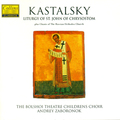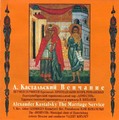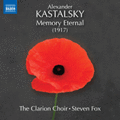Alexander Kastalsky (1856-1926)

KASTALSKY, Aleksandr Dmitriyevich (b. 16 [28] November 1856, Moscow; d. 17 December 1926, Moscow) — studied theory and composition at the Moscow Conservatory under Tchaikovsky, Taneyev, and Gubert. From 1887 and for most of his career, Kastalsky was closely connected with the Moscow Synodal School of Church Singing, initially as a teacher of piano and conducting, from 1891 as assistant conductor (to Vasily Orlov), from 1900 as one of the precentors (of the left choir), and from 1910 as director of the School. From 1918 to 1926, when the Bolsheviks made it impossible for the Synodal School to continue its existence, he tried to salvage it in the form of the “People’s Choral Academy,” which eventually was absorbed into the Moscow Conservatory. Besides being active in church music, Kastalsky throughout his life worked in the field of musical ethnography, studying the characteristics of the Russian folk song, making arrangements of folk songs, and using elements of the latter in his compositions.
As a composer, Kastalsky is a seminal figure, who was recognized by his contemporaries as having created a new direction in Russian church music. His followers included Pavel Chesnokov, Alexandre Gretchaninoff, Aleksandr Nikolsky, Viktor Kalinnikov, Constantine Shvedoff, and Sergei Rachmaninoff, among others. In Kastalsky’s sacred works, melodies and individual chant formulas of znamenny and other chants are combined with techniques of counter-voice polyphony, drawn from the Russian choral folk song. The skillful use of these peculiarly Russian elements give Kastalsky’s works a marked national flavor, while the use of church chants link them to ancient traditions of the church-musical aesthetic.
Kastalsky’s published sacred works and arrangements number approximately 175 (many published numbers contain several separate titles); there are also a number of unpublished works, primarily comprising arrangements of various pattern melodies (podobnï). Kastalsky also edited the Obikhod Sinodal’novo khora [The Common Book of the Synodal Choir] in 1914. To make the performance of hymns in the so-called “common” chants more meaningful, he compiled the Prakticheskoye rukovodstvo k vïrazitel’nomu peniyu stikhir pri pomoshchi razlichnïkh garmonizatsiy [A practical manual for the expressive singing of stichera with the help of various harmonizations], which selectively applies major and minor harmony in accordance with the meaning and mood of a given liturgical texts.
 Alexander Kastalsky
Kastalsky (1856-1926): Liturgy of St. John Chrysostom and Chants of the Russian Orthodox Church
Alexander Kastalsky
Kastalsky (1856-1926): Liturgy of St. John Chrysostom and Chants of the Russian Orthodox Church
 Alexander Kastalsky
When Augustus Ruled Alone
Alexander Kastalsky
When Augustus Ruled Alone

Praise the name of the Lord
God Is With Us (3 Classic CDs in mp3 format)
Choirs of the Holy Trinity-St Sergius Monastery and Moscow Theological Academy
| Get the Sheet Music for this track: Ks118 |  |

Troparion for the Nativity of Christ
Hymns of the Russian Orthodox Church (2 CD set)
Choir of the Church of "Joy of All Sorrowful" Icon - Moscow
| Get the Sheet Music for this track: Ks007 |  |

Kontakion for the Nativity of Christ
Hymns of the Russian Orthodox Church (2 CD set)
Choir of the Church of "Joy of All Sorrowful" Icon - Moscow
| Get the Sheet Music for this track: Ks008 |  |

Paschal Verses
Holy Russia: Hymns of Great Lent and Pascha (2 CDs)
Church Choir of "Joy of All the Sorrowful"










